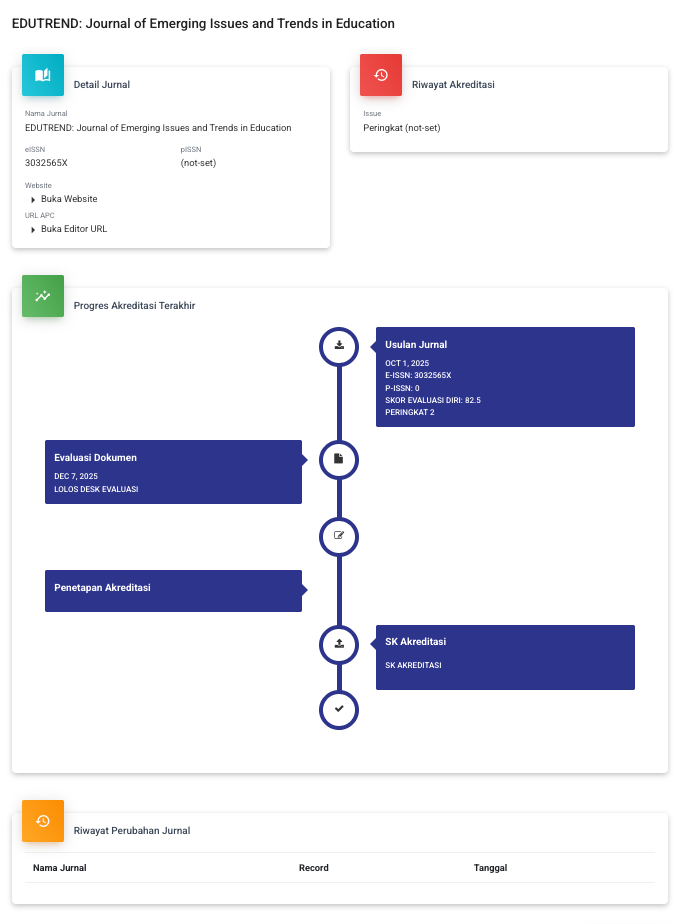The Relationship Between Phubbing Behavior and Student Empathy at Garudaya Bontonompo Vocational School
DOI:
https://doi.org/10.59110/edutrend.503Keywords:
Digital Learning, Educational Psychology, Empathy, Phubbing Behavior, Social-Emotional LearningAbstract
This study investigates the relationship between phubbing behavior and students’ empathy in the context of digital learning at SMKS Garudaya Bontonompo, Indonesia. The research employs a quantitative correlational design with a sample of 135 students selected through simple random sampling. Data were collected using two standardized instruments: the Phubbing Behavior Scale and the Empathy Scale, both of which demonstrated high reliability coefficients. Descriptive and inferential statistical analyses were conducted using SPSS version 23.0. The results indicate a strong and significant negative correlation (r = –0.806, p < 0.05) between phubbing behavior and empathy, suggesting that increased smartphone-centered activity corresponds with decreased emotional understanding. These findings emphasize the need for balanced digital engagement in educational settings and highlight the psychological impact of smartphone dependency on social-emotional development. The study recommends integrating social-emotional learning (SEL) and digital citizenship education into classroom practices to foster empathy and responsible technology use among students.
References
Abbas, N., Ashiq, U., Hassan, S., & Alam, M. (2020). An empirical approach to study smartphones’ usage in academic performance of university students. Review of Applied Management and Social Sciences, 3(2), 279–286. https://doi.org/10.47067/ramss.v3i2.61
Ammunje, R., H., M., & Barkur, G. (2022). Smartphones and academic performance: Evidence from India. Interactive Technology and Smart Education, 20(2), 161–176. https://doi.org/10.1108/itse-11-2021-0204
García, M., Soto-Varela, R., Marchena, J., & del-Pino-Espejo, M. (2020). Using mobile devices for educational purposes in compulsory secondary education to improve students’ learning achievements. Sustainability, 12(9), 3724. https://doi.org/10.3390/su12093724
Rozgonjuk, D., Levine, J. C., Hall, B. J., & Elhai, J. D. (2018). The association between problematic smartphone use, depression, anxiety, and personality: A systematic review and meta-analysis. Journal of Affective Disorders, 244, 91–98. https://doi.org/10.1016/j.jad.2018.09.056
Duradoni, M., Raimondi, T., Buttà, F., & Guazzini, A. (2023). Moving beyond an addiction framework for phubbing: Unraveling the influence of intrinsic motivation, boredom, and online vigilance. Human Behavior and Emerging Technologies, 2023, 1–13. https://doi.org/10.1155/2023/6653652
Rahmah, M., & Sanyata, S. (2024). Phubbing and its impact on student communication and relationship: A qualitative study on coping strategies and social implications. Al-Ishlah: Jurnal Pendidikan, 16(4), 4876–4889. https://doi.org/10.35445/alishlah.v16i4.5801
Balqis, H., Ali, A., Marisa, S., & Gunawan, G. (2024). Dampak penggunaan smartphone terhadap perilaku sosial siswa. Atthiflah: Journal of Early Childhood Islamic Education, 11(1), 207–216. https://doi.org/10.54069/atthiflah.v11i1.722
Fauziyah, S. (2022). Hubungan antara empati dengan perilaku phubbing pada remaja awal di Desa Ngepung Kecamatan Patianrowo Kabupaten Nganjuk (Doctoral dissertation, IAIN Kediri).
Bottaro, R., & Faraci, P. (2022). The use of social networking sites and its impact on adolescents’ emotional well-being: A scoping review. Current Addiction Reports, 9(4), 518–539. https://doi.org/10.1007/s40429-022-00445-4
Yue, H., Gao, S., Feng, F., Wu, F., Bao, H., & Zhang, X. (2024). Linking adolescents’ phubbing to depression: The serial mediating effects of peer relationship quality and psychological need frustration. Frontiers in Public Health, 12. https://doi.org/10.3389/fpubh.2024.1420151
Cervera-Flores, W., Choque-Garibay, Y., Gonzalez-Cordero, N., Meneses-Claudio, B., Solis-Matta, H., & Matta-Zamudio, L. (2020). Level of empathy in nursing students attending clinical practices of the Universidad de Ciencias y Humanidades. Advances in Science, Technology and Engineering Systems Journal, 6(1), 178–183. https://doi.org/10.25046/aj060120
Santana‐Monagas, E., Alonso, J., & León, J. (2025). Teacher empathy messages: The role of teacher enthusiasm and student outcomes. British Journal of Educational Psychology, 95(S1). https://doi.org/10.1111/bjep.12766
Wang, S., Li, X., Lu, J., & Yu, M. (2022). Perceived teacher empathy and teenagers’ positive academic emotions: The mediating effect of interpersonal emotion regulation. School Psychology International, 43(5), 443–459. https://doi.org/10.1177/01430343221113004
Osher, D., Kidron, Y., Brackett, M., Dymnicki, A., Jones, S., & Weissberg, R. (2016). Advancing the science and practice of social and emotional learning. Review of Research in Education, 40(1), 644–681. https://doi.org/10.3102/0091732x16673595
Ruhalahti, S., Cuenca, R., & Rieble-Aubourg, S. (2023). Acquiring socio-emotional skills through digital badge-driven learning: A case study of teachers’ experiences in Barbados and Trinidad and Tobago. Inter-American Development Bank Report. https://doi.org/10.18235/0004858
Talavera, E., Garrido, M., Sánchez, M., & Uribarri, M. (2017). Orientación de las competencias socioemocionales de los alumnos de educación secundaria en contextos multiculturales. Electronic Journal of Research in Educational Psychology, 5(11). https://doi.org/10.25115/ejrep.v5i11.1232
Claudia, C. (2022). Socio-emotional development of students in the context of the COVID-19 pandemic. European Proceedings of Educational Sciences, 701–708. https://doi.org/10.15405/epes.22032.69
Silber‐Varod, V., Eshet‐Alkalai, Y., & Geri, N. (2019). Tracing research trends of 21st‐century learning skills. British Journal of Educational Technology, 50(6), 3099–3118. https://doi.org/10.1111/bjet.12753
Downloads
Published
How to Cite
Issue
Section
License
Copyright (c) 2025 Muhrawati, Alamsyah, Rukiana Novianti Putri

This work is licensed under a Creative Commons Attribution-ShareAlike 4.0 International License.















 the Creative Commons Attribution-ShareAlike 4.0 International License |
the Creative Commons Attribution-ShareAlike 4.0 International License | 